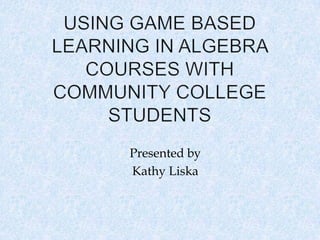
Game based learning 2011
- 1. Using Game Based Learning in Algebra Courses with Community College Students Presented by Kathy Liska
- 2. Purpose Math Anxiety Stress Remedial or developmental mathematics Immersion Processes Critical thinking
- 3. Statistics National Center on Education and the Economy (NCEE) 2/3 of students entering high school graduate 2/3 of those graduates go on to higher education 2/3 of those must take remedial classes in college (Tough Choices or Tough Times)
- 4. More Statistics 21% of students applying to 4 year colleges are ready for college level reading, writing, math, or biology (NCEE) 43% at 2 year colleges and almost 30% at 4 year colleges have taken remedial classes Result $ 2.5 billion (Twigg)
- 5. Processes Game playing Probing Hypothesis forming Reprobing Rethinking hypothesis another hypothesis (Gee) Critical thinking Strategy
- 6. Games like learning …… Cognition Social interaction Compelling Practice mastery Challenging but not “undoable” (Gee) Feeling of achievement “Regime of competence” (Gee) Semiosis Critical thinking
- 7. Game-based Learning Tool Interactive Iterative Progressive Immersive Real world applications Instructor or commercially developed games Students use program to develop games Game Maker (http://www.yoyogames.com/gamemaker)
- 8. 21st Century Skills STEM Innovation Creativity International Adult Literacy Survey USA 13 out of 20 in quantitative literacy
- 9. Role of Community Colleges NCAT Gates Foundation Changing the Equation Process education Experiential Project based learning “In order to learn, one must do.” Carl Rogers
- 10. Student Participation Active in own learning Interactive software Work at own pace Self-directed learning
- 11. Mathematics Literacy Steen “quantitative literacy needs to become as pervasive in the curriculum as are reading and writing” Paulos Innumeracy “when” of using math Tall “shift focus of attention from steps of procedure to the effect of the procedure”
- 12. Case Study Algebra I classes 1 instructor 2 Classes Spring 2010 1 control 1 experimental 2 Classes Fall 2010 2 experimental 4 weeks middle of semester Systems of equations
- 13. Case Study Control Paper and pencil homework and practice problems Experimental Paper and pencil Online math games Use each game at least once Use >= 2 hours per week Keep track of how long used each game
- 14. Case Study - Games Each game has different skill level options Familiarity Three games: Systems of Equations Jeopardy Systems of Equations Hoop Shots One-step Equations: Battleship
- 15. Jeopardy www.quia.com/cb/79607.html 4 categories Solve by graphing Solve by substitution Solve by elimination Systems of inequalities 5 point options per category 1 or 2 player option
- 16. Hoop Shots www.crctlessons.com/systems-of-equations-game.html 3 categories Rookie Experienced Superstar 1 or 2 player option
- 17. Hoop Shots Timed 1 player option Time increased by 3 sec. for each correct answer Time decreased by 5 sec. for each incorrect answer After 10 questions answered Make as many shots as possible in accumulated time Each basket made = 3 points
- 18. Battleship www.quia.com/ba/36544.html Human vs computer 3 Levels Easy Medium Hard
- 19. Surveys Anonymous Pre and post Qualitative and quantitative 5 point Likert scale 1 = strongly disagree 2 = disagree 3 = undecided 4 = agree 5 = strongly agree
- 20. Surveys Some questions reverse coded Math anxiety Motivation Demographics
- 21. Hypotheses Hypothesis #1: Students will report having less math anxiety when they use game based learning in their algebra courses. Hypothesis #2: Students will attempt to solve more practice problems when using game based learning rather than traditional pencil and paper approach.
- 22. Hypotheses Hypothesis #3: Students using game based learning will report feeling more motivated to attempt difficult problems. Hypothesis #4: Younger students will more easily adapt to using a new game program for practicing algebra problems than older students.
- 23. Results Experimental 8 out of 32 used games (25%) Equal number of males and females Ages (Game Users) Females 18 - 22 Males 18 – 30 Ages (Non Game Users) Females 18 – 26 Males 18 - 39 No real difference
- 24. Results – Game Usage “If you did not use any of the games, please indicate why by choosing one of the following” Non Game Users 76.5% (13/17) selected “not enough time” 2 selected “other” 1 selected “didn’t see the point”, “not interested”, and “other”
- 25. Results - Anxiety Likert scale Higher scores indicate a higher level of anxiety Mean score Control group 33.9 Experimental non game users 31 Experimental game users 27
- 27. Individual Anxiety Scores Game users Reduction in scores for all but 1 student Average reduction = 8.6 Range -22 points to +4 points
- 28. Attempting Difficult Problems Not much difference Inconclusive Need for more research
- 29. Future Research Larger sample size Embed games in Algebra course Curriculum development Throughout all modules not just one Game development for adults Games limited in scope Game Maker
- 30. Game Maker Have students create game based on given scenario Parameters to measure How long it takes to do homework Comfort level of students using Game Maker Impact on students performance?
- 31. Lessons Learned Use more specific questions in survey What about online classes? Comparison with traditional classroom Embed game based learning in Algebra curriculum Compare to traditional classroom
- 32. Conclusions More research is necessary Need for new tools to assist students Need for innovative approach to teach math Use of real world applications Need for game development geared toward adult college students Continuous mathematics literacy needs to be reinforced starting in early childhood
- 33. Works Cited Gee, James Paul. What Video Games Have To Teach Us About Learning and Literacy. New York: Palgrave Macmillan, 2007. National Center on Education and the Economy (2008). Tough Choices or Tough Times. San Francisco: Jossey-Bass. Steen, Lynn Arthur. “How Mathematics Counts.” Educational Leadership, 65.3 (November 2007): 8-14. Empire State College EBSCOHost database. 31 May 2009. Tall, David. “The transition to formal thinking in mathematics.” Mathematics Education Research Journal. 20.2 (2008): 5-24. Empire State College EBSCOhost. 31 May 2009.
- 34. Questions?
